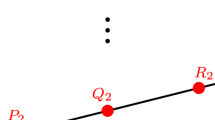Abstract
We describe a new connection between the problem of finding rigid matrices, as posed by Valiant (MFCS 1977), and the problem of proving lower bounds for linear locally correctable codes. Our result shows that proving linear lower bounds on locally correctable codes with super-logarithmic query complexity will give new constructions of rigid matrices. The interest in constructing rigid matrices is their connection to circuit lower bounds.
Our results are based on a lemma saying that if the generating matrix of a locally decodable code is not rigid, then it defines a locally self-correctable code with rate close to one. Thus, showing that such codes cannot exist will prove that the generating matrix of any locally decodable code (and in particular Reed Muller codes) is rigid.
This connection gives, on the one hand, a new approach to attack the long-standing open problem of matrix rigidity and, on the other hand, explains the difficulty of advancing our current knowledge on locally correctable codes (in the high-query regime).
Similar content being viewed by others
References
M. Alekhnovich. More on average case vs approximation complexity. In FOCS ’03: Proceedings of the 44th Annual IEEE Symposium on Foundations of Computer Science, page 298, Washington, DC, USA, 2003. IEEE Computer Society.
N. Alon, R. Panigrahy & S. Yekhanin. Deterministic approximation algorithms for the nearest codeword problem. In APPROX ’09 / RANDOM ’09: Proceedings of the 12th International Workshop and 13th International Workshop on Approximation, Randomization, and Combinatorial Optimization. Algorithms and Techniques, pages 339–351, Berlin, Heidelberg, 2009. Springer-Verlag.
Babai L., Shpilka A., Stefankovic D.: Locally testable cyclic codes. IEEE Transactions on Information Theory 51(8), 2849–2858 (2005)
O. Barkol, Y. Ishai & E. Weinreb. On locally decodable codes, self-correctable codes, and t-private PIR. In APPROX ’07/RANDOM ’07: Proceedings of the 10th International Workshop on Approximation and the 11th International Workshop on Randomization, and Combinatorial Optimization. Algorithms and Techniques, pages 311–325, Berlin, Heidelberg, 2007. Springer-Verlag.
A. Beimel, Y. Ishai, E. Kushilevitz, & J. F. Raymond. Breaking the o(n 1/(2k – 1)) barrier for information-theoretic private information retrieval. In FOCS, pages 261–270. IEEE Computer Society, 2002.
Blum M., Kannan S.: Designing programs that check their work. J. ACM 42(1), 269–291 (1995)
Borwein P., Moser W.O.J.: A survey of Sylvester’s problem and its generalizations. Journal Aequationes Mathematicae 40(1), 111–135 (1990)
Z. Dvir, P. Gopalan & S. Yekhanin. Matching vector codes. FOCS 2010 (to appear), 2010.
K. Efremenko. 3-query locally decodable codes of subexponential length. In STOC, pages 39–44. ACM, 2009.
Goldreich O., Karloff H.J., Schulman L.J., Trevisan L.: Lower bounds for linear locally decodable codes and private information retrieval.. Computational Complexity 15(3), 263–296 (2006)
P. Gopalan. A note on Efremenko’s locally decodable codes. Electronic Colloquium on Computational Complexity (ECCC), (069), 2009.
Huffman W.C., Brualdi R. A. Handbook of Coding Theory. Elsevier Science Inc., New York, NY, USA, 1998.
J. Katz & L. Trevisan. On the efficiency of local decoding procedures for error-correcting codes. In STOC, pages 80–86, 2000.
Kerenidis I., de Wolf R.: Exponential lower bound for 2-query locally decodable codes via a quantum argument. J. Comput. Syst. Sci. 69(3), 395–420 (2004)
Swastik Kopparty, Shubhangi Saraf & Sergey Yekhanin. High-rate codes with sublinear-time decoding. ECCC technical report TR10-148, 2010.
R. J. Lipton. Efficient checking of computations. In STACS, volume 415 of Lecture Notes in Computer Science, pages 207–215. Springer, 1990.
S. V. Lokam. Quadratic lower bounds on matrix rigidity. In TAMC, volume 3959 of Lecture Notes in Computer Science, pages 295–307. Springer, 2006.
Lokam S.V.: Complexity lower bounds using linear algebra. Foundations and Trends in Theoretical Computer Science 4(1–2), 1–155 (2009)
F.J. MacWilliams & N.J.A. Sloane. The theory of error correcting codes. 1977.
Razborov A.A., Rudich S.: Natural proofs. J. Comput. Syst. Sci. 55(1), 24–35 (1997)
Trevisan L.: Some applications of coding theory in computational complexity. Quaderni di Matematica, 13:2004, 2004.
L. G. Valiant. Graph-theoretic arguments in low-level complexity. In MFCS, volume 53 of Lecture Notes in Computer Science, pages 162–176. Springer, 1977.
L. G. Valiant. Completeness classes in algebra. In STOC ’79: Proceedings of the eleventh annual ACM symposium on Theory of computing, pages 249–261, New York, NY, USA, 1979. ACM.
D. Woodruff. New lower bounds for general locally decodable codes. Electronic Colloquium on Computational Complexity (ECCC) TR07-006, 2007.
S. Yekhanin. Towards 3-query locally decodable codes of subexponential length. J. ACM, 55(1), 2008.
Author information
Authors and Affiliations
Corresponding author
Rights and permissions
About this article
Cite this article
Dvir, Z. On Matrix Rigidity and Locally Self-correctable Codes. comput. complex. 20, 367–388 (2011). https://doi.org/10.1007/s00037-011-0009-1
Received:
Published:
Issue Date:
DOI: https://doi.org/10.1007/s00037-011-0009-1



